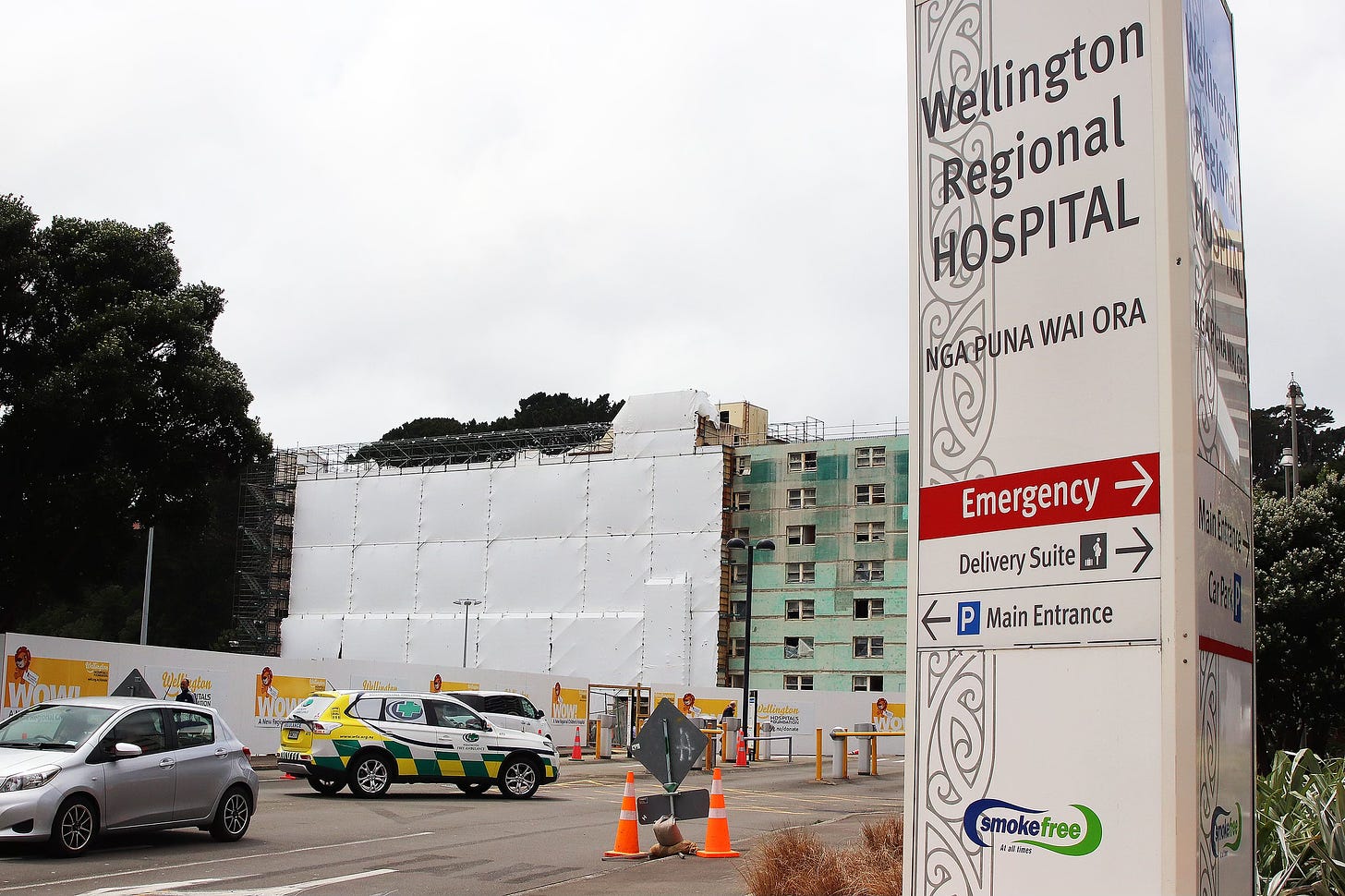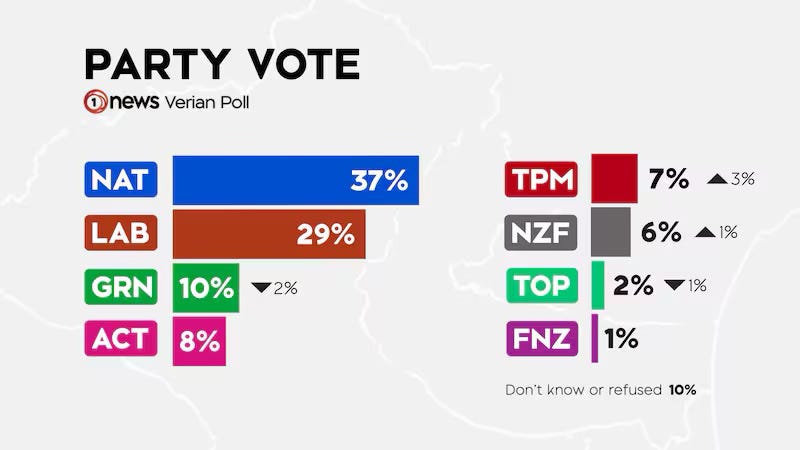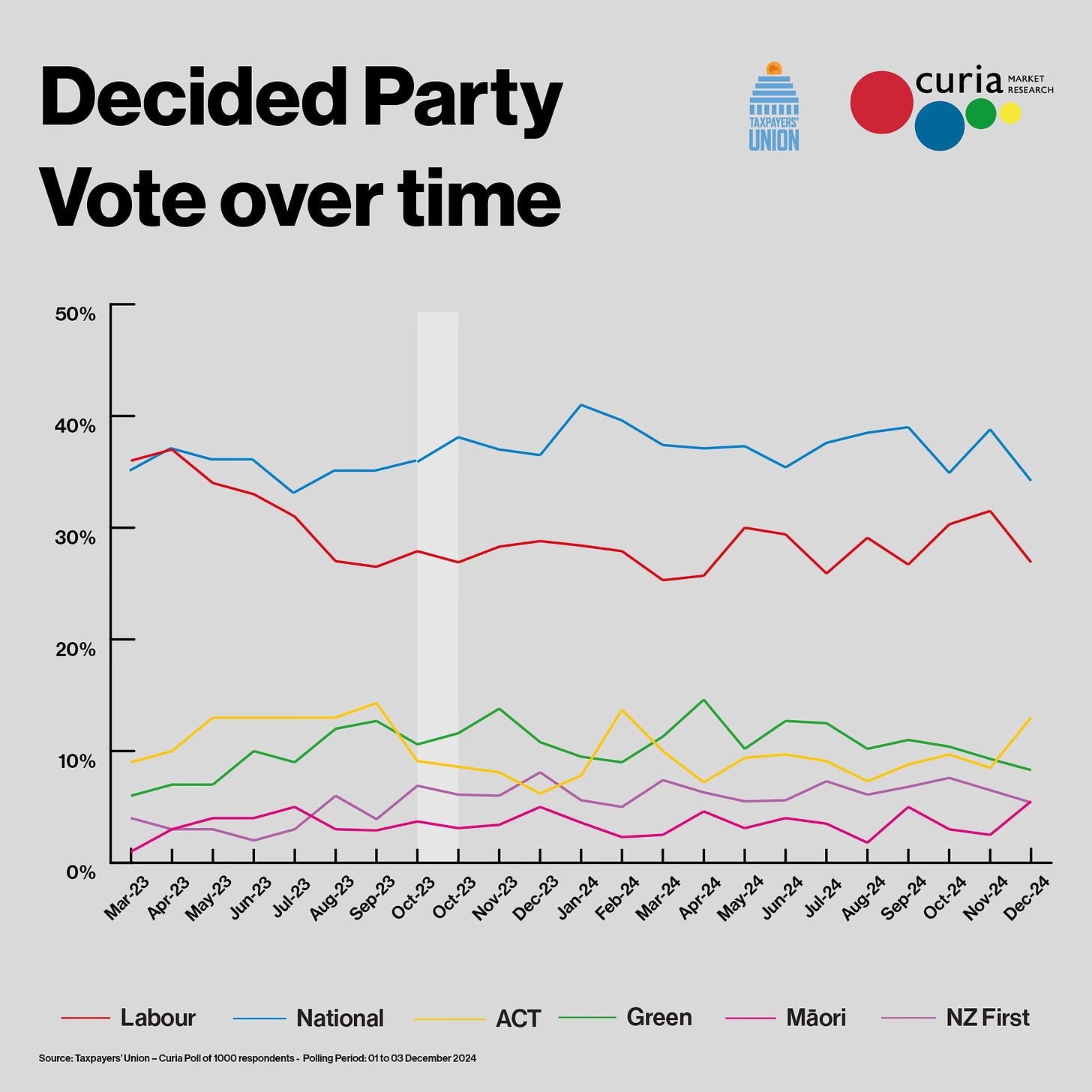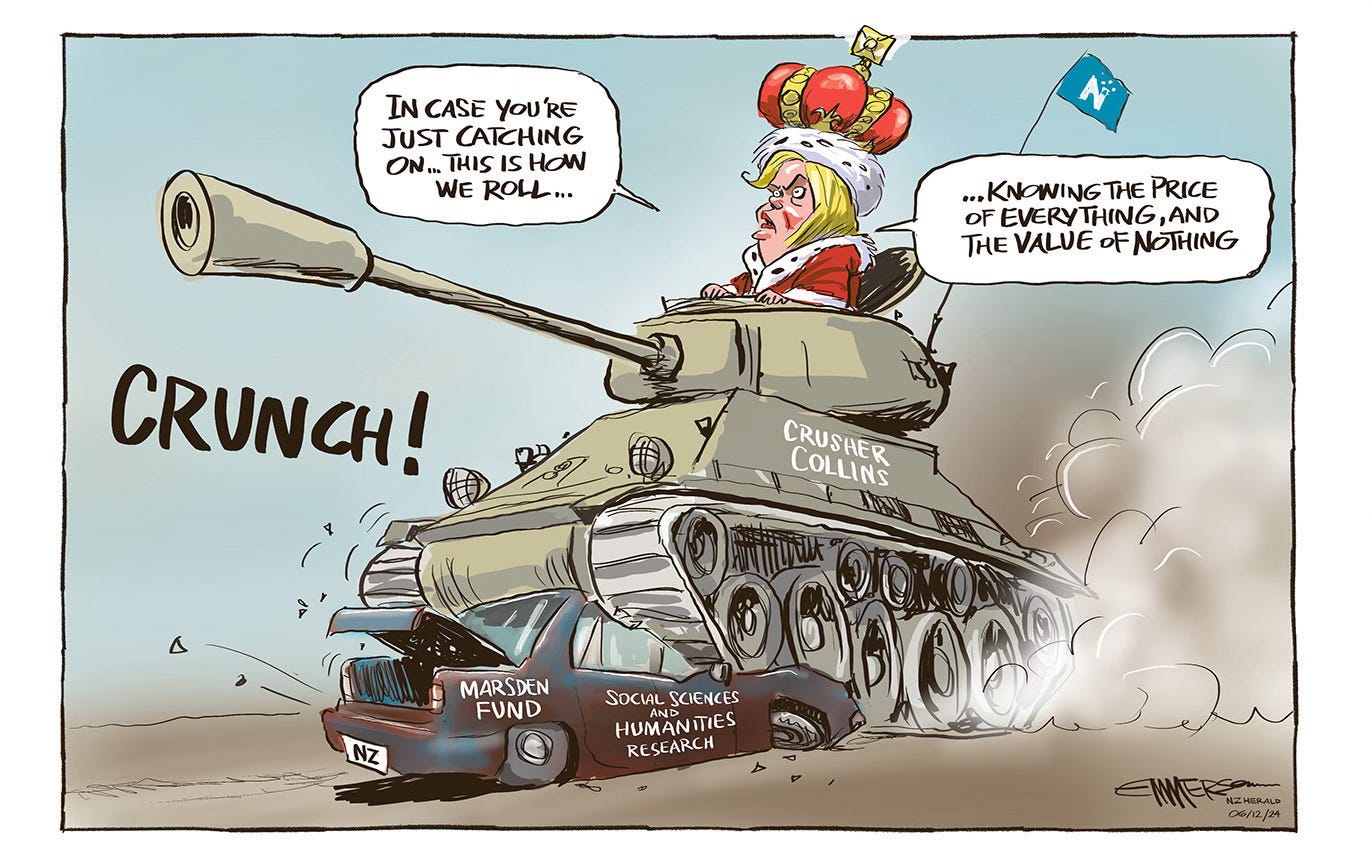
Mōrena. Long stories short, the six things that matter in Aotearoa’s political economy around housing, climate and poverty on Tuesday, December 10 are:
The Government is planning for a new type of privatisation of buildings in the health sector in particular, announcing last night it had directed officials to use ‘strategic leasing’ or what it calls ‘PPP-lite’ for health centres and other ‘technical’ buildings.
Finance Minister Nicola Willis last night put off more aggressive Government intervention in the banking market by asking the Reserve Bank to consider competition when regulating banks, and by suggesting a float and sale of new Kiwibank shares to pension funds to inject new capital for growth, but only after the 2028 election. She said the banks were ‘on notice.’
In another move to limit workers’ powers to strike for higher pay, ACT Deputy Leader and Brooke van Velden announced last night the urgent reintroduction before Christmas of pay deductions for partial strikes, saying it was needed ahead of a wave of public sector pay deals expiring in the first half of next year.
Two polls show support for Te Pāti Māori (TPM) surged to record highs in November around the hikoi, taking TPM ahead of NZ First in the 1News/Verian poll and being equal with NZ First in the Taxpayers Union-Curia poll. However, both polls showed National-ACT-NZ First remained comfortably ahead of Labour-Green-TPM. (See more in the charts below).
Replacing climate academics with business leaders, Climate Change Minister Simon Watts appointed former Governor-General Dame Patsy Reddy as the Climate Change Commission's new chairperson with former Fortescue Future Industries director Felicity Underhill and Te Manahuna Aoraki director Devon McLean as Commissioners, replacing Catherine Leining and James Renwick.
CTU economist Craig Renney and a Taxpayers Union representative were both blocked from attending next Wednesday’s Treasury briefing for media and analysis’s on the Half Yearly Fiscal and Economic Update (HYEFU), despite regular attendances for years. Treasury said it was tightening up the rules to limit it only to accredited media and financial organisations such as banks and consultancies providing information to financial markets and businesses. NZ Herald
(Normally at this point we would have a paywall for free subscribers and only paying subscribers could both listen to the podcast/video above and read the analysis and detail below. But during our ‘Gravy Day Fortnight’ until December 21, we have opened everything up for all immediately to give everyone a full taste of the public interest journalism your subscription supports. And here’s our ‘Gravy Day Fortnight’ deals, including the 50%-off introductory offer, the $30/year for under 30s deal and the $65/year for renting pensioners deal, respectively.)
Govt says get ready for ‘PPP-lite for health centres
Nurses, doctors and patients alike have feared the National-ACT-NZ First Government’s real agenda for the health system is a type of creeping privatisation, starting with buildings.
Health Minister Shane Reti fuelled those fears last week when he said his policy on privatisation was ‘not overt’. Here’s the full quotes via RNZ’s Ruth Hill (bolding mine):
Following his speech to the Association of Salaried Medical Specialists conference in Wellington today, Dr Reti was asked whether the government's approach was creating a two-tiered system, "with private healthcare for the haves, and the underfunded public system for the have-nots".
"Mr Seymour says he's going to privatise health. So what are your comments on that? Is it true?" asked the union's national president, Dr Catherine Ben.
"I have the privilege of being the Health Minister and that's not my overt policy," Reti replied.
He would like to see "greater collaboration" with private facilities and private operators, particularly on the government's list targets.
However, his message to the private sector was that taxpayer money had to benefit the public, and they had had a "quid pro quo responsibility" to build capacity in the public system.
"That is the deal - this is not just Crown funding going to your balance sheet, God bless you....so you will see us increasing the relationship and outsourcing to the private operators - that is not at all a step toward privatisation at all, that is not my agenda.
"My agenda is to lift the capacity of the public system so it's there when we need it." RNZ’s Ruth Hill
Late yesterday, Infrastructure Under-Secretary Simon Court fleshed out some of the Government’s thinking on how to involve the private sector more in the health system, announcing a new ‘strategic leasing’ policy.
Here’s his key comments (bolding mine):
“On a basic level, strategic leasing is like any other government leasing arrangement, where the government takes out an exclusive lease from an asset owner in exchange for regular payments, such as for office accommodation.
“However, this new strategic leasing guidance will help government agencies tailor leasing arrangements to apply to a wider range of assets. This could include technical buildings such as health centres, or accommodation after a natural disaster.
“Strategic leasing adds to a suite of infrastructure delivery pathways, recognising that the Government doesn’t need to own every asset it uses. It offers a sweet spot between knowing we have what we need – when and where we need it – and flexibility to change as our needs do."
Mr Court says elements like private finance, and the corresponding discipline and incentives this drives, makes strategic leasing akin to ‘PPP-lite’.
“Like with PPPs, lease payments depend on the asset being delivered and available at a certain standard, which drives strong asset delivery and performance incentives.” Simon Court in a statement
Court also made clear the genesis of the coalition’s thinking.
“Health infrastructure is an especially important area of need in New Zealand, and one for which strategic leasing presents great opportunity – something recognised and prioritised in the ACT-National coalition agreement.”
Top six news and longer-reading links elsewhere
Breaking: Charges will be filed separately against Woolworths NZ, Pak’nSave Silverdale, and Pak’n’ Save Mill Street 1News
Scoop: Healthcare staff asked to 'fill in' on reception RNZ’s Ruth Hill
Deep-dive: More than half of government targets behind track RNZ’s Farah Hancock
Column: When a ban is an accolade: Our media person of the year 2024 Newsroom’s Tim Murphy
Op-Ed: To call this voodoo economics is an insult to voodoo Rob Campbell via Newsroom
Solutions & good news: Breaking barriers: How new doctor champions Māori health in medicine NZ Herald
Charts du Jour: TPM on a tear


Cartoon of the day: Machine politics

Timeline-cleansing nature pic
Mā te wā
Bernard
















Share this post